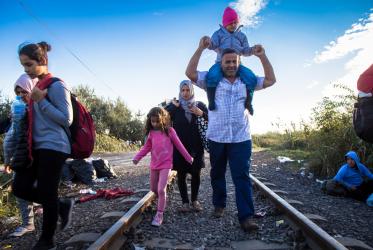Displaying 1 - 20 of 28
The cry of the Papuans in Indonesia
14 November 2019
A faith-based, holistic approach to HIV and AIDS-care
13 March 2019
Turning mercy and compassion into action
04 March 2019
Yet another sad anniversary for Christians in war-torn Syria
17 October 2018
G20 summit: call to pray for peace in Hamburg
07 July 2017
WCC appeals for support, for all to stand #WithRefugees
31 August 2016
Symposium focuses on religion, violence, extremism
04 February 2016
WCC/UN conference calls for coordinated action on refugee crisis
20 January 2016
“European solidarity must be strengthened”
29 October 2015
WCC urges responsibility for and support to the refugees in Europe
04 September 2015
WCC Executive Committee speaks out on migrant crises
12 June 2015













